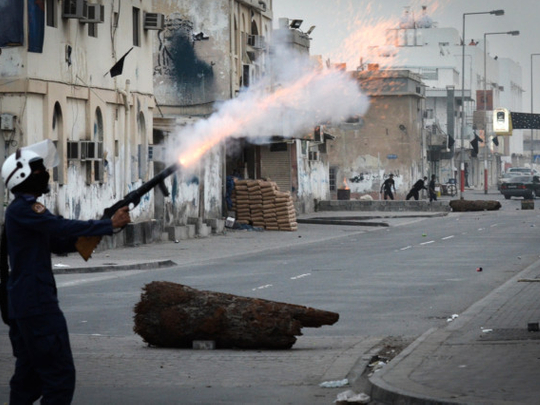
Manama: Bahrain’s crown prince has made a renewed appeal for dialogue to end the political impasse in the country, a call welcomed by the opposition, despite no end in sight to violent protests. Prince Salman Bin Hamad Al Khalifa, widely viewed as a moderate member of the government took the opportunity when hosting a global security conference last week to invite the opposition to sit down and talk.
“We had our own experience of the so-called Arab Spring last year. It divided the nation, and many wounds are still to be healed,” he told the conference.
“I am convinced... that dialogue is the only way forward” he said. But he also said “opposition leaders must condemn violence on the streets. Silence is not an option,” while insisting that “political groups must be reconciled.”
For her part, State Minister for Information Samira Rajab told AFP that “dialogue is the only solution; a consensual dialogue between all forces to reach a comprehensive solution.”
Al Wefaq, the largest Shiite opposition formation, seized on the crown prince’s proposal and responded positively, but demanded a “serious dialogue” and said the results must be subject to a referendum.
The crown prince’s latest overture is just one in a series of calls he has made since February 2011.
The opposition has repeatedly said it was ready for a meaningful dialogue, but has stuck to its demands for a real constitutional monarchy with an elected prime minister.
Khalil Al Marzouq, a former Al Wefaq MP, said the group was ready to talk.
“We are ready for dialogue without any conditions,” he said, reiterating his movement’s position, which does not challenge the government but demands that “the prime minister be named by the elected parliament.”
Current Prime Minister Prince Khalifa Bin Salman, an uncle of the king, has been in office since 1971.
Calls for his removal echo in almost every demonstration organised by Al Wefaq or any other Shiite opposition group.
But on the walls in Shiite villages outside Manama, graffiti calls for more: the departure of King Hamad.
In those villages black flags of mourning fly and portraits of the revered seventh century Emam Hussain are displayed next to posters of radical Shiite opposition figures jailed following last year’s crackdown on dissent.
Despite a clampdown in which a protest camp at Manama’s Pearl Square was demolished and protesters were chased back to their villages, it was not long before demonstrators were back on the streets.
According to the International Federation for Human Rights, a total of 80 people have been killed in Bahrain since the violence began on February 14, 2011.
Confrontations between mostly youthful protesters and police occur frequently after calls made on social media networks by the “February 14 Movement,” which was behind last year’s protests.
The demonstrations in Shiite villages often turn violent with protesters using petrol bombs and police responding with tear gas and birdshot.
Key ally Washington urged the Bahraini authorities in November to exercise self-restraint.
Some observers questioned whether traditional opposition groups, mainly Al Wefaq, are in control over protests, as radical groups appear more active.
“We have not lost control of the street,” insisted Al Marzouq, but adding that protesters’ demands have become “stern,” and acknowledging that “violence has increased.”
Manama came under strong criticism from international rights group over last year’s deadly crackdown.
An international panel commissioned by King Hamad found that excessive force and torture was used against protesters and detainees.
The government claims to have begun a robust implementation of the special commission’s recommendations.
“Almost all those sacked” for taking part in protests, estimated at around 4,400 people, “have been reinstated in their jobs,” and police have adopted a “new code of conduct,” Rajab said.












